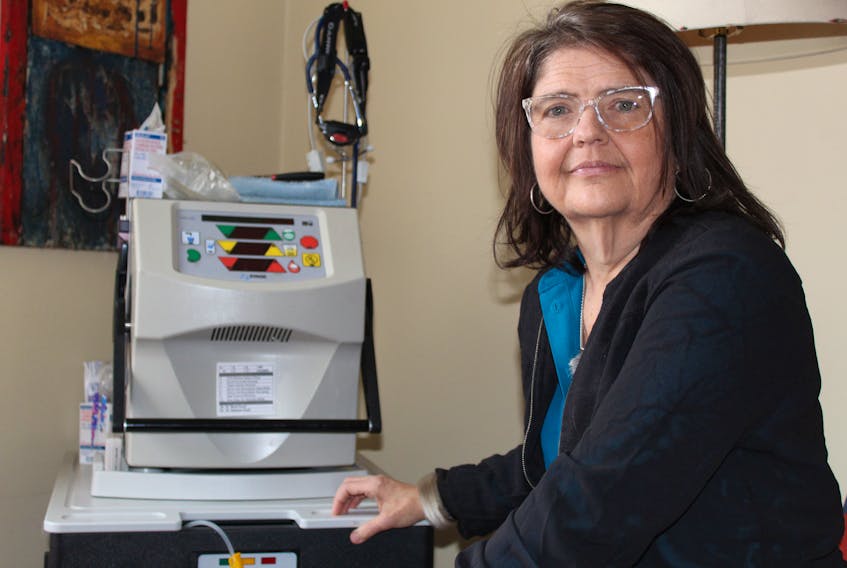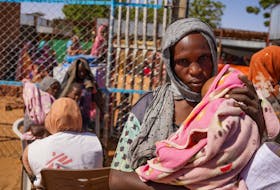ST. JOHN'S, N.L. — The home dialysis machine is a necessary piece of furniture in Leah Lewis’s downtown home. Organ donation was necessary to prolong her life and it’s vital to save the life of her brother, athlete Peter Lewis.
Leah had two kidney transplants as a child — the first one failed early, but she thrived on her second transplant for longer than average.
Peter, a well-known St. John’s endurance running champion and artist, is in Ottawa awaiting a heart transplant.
For Leah, the chances of a match for a third transplant have gotten more difficult due to the antibodies that have built up in her system, typical of the complications that come with multiple transplants, she said.
Peter, a member of the Newfoundland and Labrador Athletics Hall of Fame, said he’s still trying to get his head around the transplant and, while he waits, he’s focused on keeping fit and plans to walk the 10-K Run Ottawa marathon event May 25 to raise awareness for heart and stroke disease as well as the importance of organ donation.
Among his athletic achievements: at the age of 15, Lewis ran the first of his 17 Tely 10s. He won the race twice (1984 and 1989), finished second four times and was third on a couple of occasions.
Fifteen years ago, he ran the Ottawa event and came 10th overall.
“It’s kind of ironic, thinking about doing it again,” said Peter, who back then never thought he’d ever have to slow down and walk it, let alone be on a heart transplant list.
For obvious reasons, the gift of organ donation is clear to both siblings, but they acknowledge for some people, the crucial steps that must be taken to become an organ donor don’t resonate.
“A lot of people don’t think about it,” Peter said in a phone interview from Ottawa.
Some of it may be the difficultly of thinking about one’s mortality when it comes to those organs that can be donated only in death, such as a heart.

Peter has been in Ottawa since December. About eight years ago, he was diagnosed with an enlarged heart, or cardiomyopathy, a genetic condition. About three years ago, he developed heart failure.
Still, the retired physical education teacher achieved the feat of a 600-kilometre bike ride with his wife and children in India a year ago, though he avoided the mountainous sections.
While waiting for the transplant, he takes an intravenous heart medication carried in a fanny pack. He weighs himself every day, monitors his blood pressure and is assisted by a home care nurse who cleans the IV, while he has learned to change the bag himself.
“I always thought I had a big heart, but I guess it was in more ways than one,” he said.
“It shocks you, but you go on living. The only choice you have is to go on and keep moving.”
Peter said the network of patients who are waiting in Ottawa, or who have had the transplant and are receiving checkups, is encouraging.
“There’s a very supportive group of people here,” he said. “There are three or four others up here at the moment waiting.”
When a heart becomes available that is a suitable match, there will be a four- to six-hour window for the surgery to happen.
“It could be next month, it could be next year. It’s hard to say,” Peter said.
Like his sister, Leah, Peter sees the merit in an organ donation program adopted by other countries — in which people are on it until they opt out — as a way to increase organ donor numbers.
A decade ago, Leah wrote a piece for The Telegram called “A letter to a dead man; Organ donation affects the overall health of Canadians.”
It was the 20th anniversary of her kidney transplant, which took place March 15, 1986 at the Hospital for Sick Children in Toronto. She thanked the person who gave her the kidney — she had also sent a letter to the unnamed person’s family through the organ procurement program.
“I was able to travel the globe, to Africa, Europe and Nicaragua. I had completed graduate school, and felt the energy of health flowing through my veins. I felt immense gratitude then, and I still do today,” Leah said in a new letter to the editor.
Leah obtained a doctorate degree and is a professor at Memorial University.
She got more years than were expected out of that successful transplant, which occurred when she was 10.
But 10 years ago, her gifted kidney finally failed, and she returned to dialysis. She uses a home dialysis machine, the main component of which can be packed for travel.
In that decade, she has had nearly 2,000 treatments and has spent more than 7,000 hours on the machine. She figures during that waited time, she alone has cost the system upward of $1 million, not including hospitalizations.
Outside of finding a match kidney — the options include a national registry for complicated cases like hers, and she participates in annual screening — Leah pins some hope on medical advances such as work by University of California San Francisco scientists’ efforts to develop an artificial kidney that would replace dialysis.
“It’s typical for dialysis patients to feel like they are operating on half-battery all the time,” Leah said at her home this week.
“There’s nothing to do but just be positive. The reality is, the likelihood of me being on dialysis the rest of my life is very strong,” she said.
Lots of dialysis patients, she said, aren’t well enough to work. Two years ago, the dialysis was failing as her access site kept blocking. Friends and family stepped up an organ donation awareness program. She’s stable now.
Stability means being on the dialysis machine every 48 hours.
She noted people who want to donate organs not only need to sign donor cards, but inform their families and carry the card with them at all times.
“Canada is way behind the eight ball,” said Leah, who is well versed in the research on donor rates.
According to federal government numbers, in 2016, for example, more than 4,500 people were waiting for organ transplants in Canada. About 2,835 organs were transplanted and 260 people died while waiting for a transplant.
Possible organ donations by the living are a kidney, part of the liver and a lobe of the lung.
Related link:









